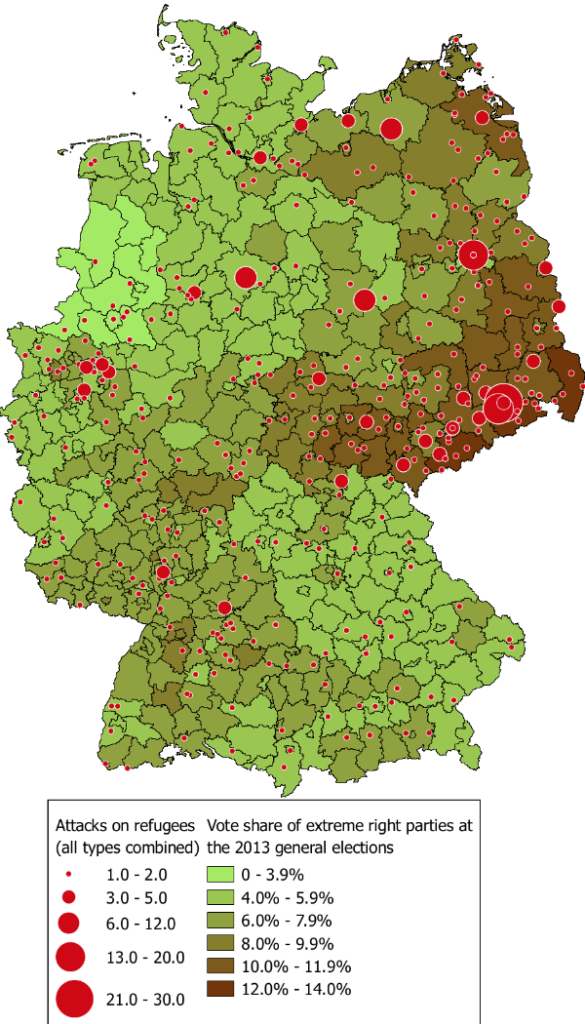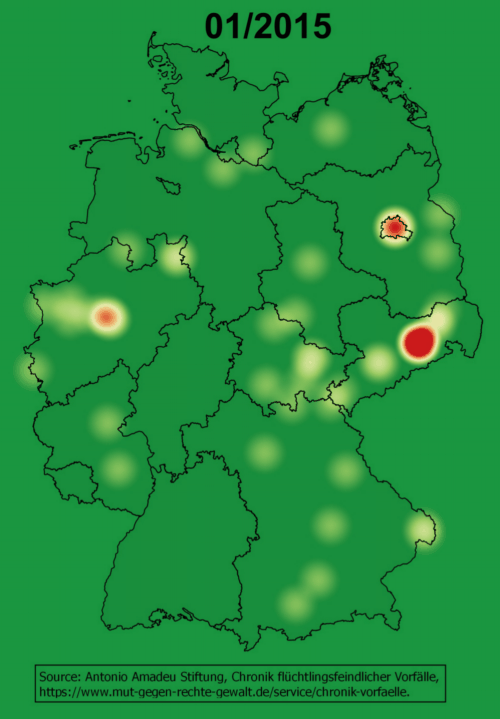Xenophobic violence after Brexit: how Britain could learn from Germany’s experience
Germany has experienced a rise in xenophobic attacks since it began to welcome refugees from Syria and elsewhere. Sebastian Jäckle and Pascal D. König have mapped these attacks and drawn some striking conclusions about their causes. They were more common in regions with a strong far-right presence and fewer migrants. One attack also tended to spark others – as did condemnation of xenophobia by national leaders, and Islamist terror. Britain saw a similar spike in xenophobic crime after the referendum. The authors ask whether the UK can learn from Germany’s painful experience.

Migrants arrive at a reception centre in Passau, December 2015. Photo: Metropolico.org via a CC-BY-SA 2.0 licence
Brexit may well turn the United Kingdom into a different country. Although the initial challenges are political and economic, recent months have shown that there may also be changes on a deeper level to the social fabric of the UK. Since the vote, racially motivated violence and harassment has gone up. A considerable rise of 42 percent was registered in the last two weeks of June, compared to the same month in 2015. Although the spike was temporary and figures went down again, the heightened number of hate crimes has been sustained for months.
Brexit and the debates that preceded it are likely to have played a role in these figures. Indeed in the month of the referendum vote, a number of news outlets – among them the Washington Post, the Guardian and CNN – reported a wave of xenophobic hate crimes and directly linked them to the Brexit vote. The connection is not hard to make. Immigration was the major issue in the referendum campaign, and the Leave campaign exerted considerable effort on evoking a negative and threatening image of immigrants, warning of a virtual invasion by migrants that was unavoidable as long as EU free movement rules applied.
Looking at Germany may help to understand the causes of xenophobic violence in Britain
Despite the tight link between immigration and the referendum it is safe to say that the Brexit in itself is neither the whole story – nor really an actual explanation – but rather a catalyst for existing strong xenophobic attitudes in Britain. The wave of racial and religiously motivated violence therefore deserves a closer look to better understand its real causes. It may be instructive to take a look across the Channel at a country that has also experienced a rise of racial and ethnic violence, particularly from 2015 onwards: Germany.
Although Germany has taken in a large number of refugees – according to the latest figures, more than 800,000 in 2015 – there have also been a huge number of attacks on and protests against refugees. There was a discernible increase last year compared to 2014, amounting to almost daily attacks on refugees or refugee accommodation throughout the country in 2015 – a trend that seems to continue in 2016. This has somewhat tainted the spirit of the “Welcome Culture” (Willkommenskultur), for which Germany has received international praise.

Source: Official data from the Bundeskriminalamt including all types of criminal offences against accommodations for refugees (property damage, propaganda and agitation, arson attacks, sedition)
The fewer migrants, the more xenophobic attacks
It should be noted, though, that the attacks are not uniformly spread. As several newspaper articles have reported these assaults have been especially frequent in Eastern Germany. While this is true, this diagnosis conceals the underlying actual drivers of the attacks. Common explanations resort to socioeconomic structural factors that indicate deprivation (e.g. unemployment) and anomia (e.g. political disaffection or alienation). However, our study, which analyses xenophobic attacks at the level of German districts, has shown that these kinds of factors are of little explanatory value when looking at their effect on attacks. In contrast, another variable shows up as highly important: the share of people with a migration background. Districts with low numbers of migrants exhibit the largest probability of attacks occurring. Interestingly, a similar phenomenon could be observed with regard to the Brexit, as those local authorities with the highest Remain vote were also those with higher net migration. This may seem paradoxical but it conforms to a long-standing sociological hypothesis, which states that more frequent interactions with people from other groups reduce prejudice and can foster understanding.
In regions where far right parties are strong, attacks are more frequent
On the other hand, the political context – specifically in the form of far-right party strength in a district – has a positive effect on attacks against refugees. With more support of extreme right parties as well as of the anti-immigrant right-wing populist party AfD (“Alternative für Deutschland”) the probability of xenophobic attacks causing personal injuries, as well as (arson) attacks on refugee accommodation rises, as Figure 2 illustrates.

Figure 2: Attacks on refugees and vote share of extreme right and populist right-wing parties at the 2013 Federal Election
Besides the influence of relatively stable contextual factors, there is also a dynamic component regarding the pattern of attacks. Specifically, there seems to be a contagion effect that follows a simple principle: the probability of an attack in a district on a given day rises if there has been an attack shortly before in the proximity (e.g. in a neighbouring district) – and the closer the attack was, the more the probability increases.
The pattern of attacks becomes more diffuse over time
However, after more than 18 months of persistent attacks on refugees in Germany, it seems that the pattern of attacks has become more diffuse over time as the contagion dynamic weakens and stable contextual explanatory factors become less important. At the same time, there is some kind of path dependency in the form of an accumulation of attacks in certain areas: where they have happened before, they are considerably more likely to occur again.
Specific incidents can act as catalysts for further attacks
Moreover, 2016 in particular has shown that attacks on refugees can also be driven by specific incidents – and therefore become even less predictable. We have identified three types of such incidents:
- Attacks by Islamist terrorists, such as the assault on Charlie Hebdo which attracted a great deal media coverage and thereby invoked fears and the perception that it is necessary to act upon this danger. With many far-right supporters not clearly distinguishing between Islamic terrorists and Muslim refugees, the latter become a sitting target.
- Prototypical attacks on refugee accommodation in some places in Eastern Germany (e.g. in Heidenau or Freital). During 2015, these places became synonymous with a xenophobic Germany and many politicians have harshly condemned the violent protests and attacks that happened there. Yet phrases such as “This is dark Germany” by German President Joachim Gauck, or Vice Chancellor Sigmar Gabriel dubbing the xenophobic protestors a “pack” may have incited them to pursue their attacks.
- Criminal acts committed by refugees that reinforce existing prejudices – for example, (social) media reports about brawls among refugees in their accommodation, or incidents of pickpocketing and robbery.
Germany has seen one such incident of the latter type that acted as a catalyst for a severe wave of attacks against refugees – the sexual assaults that occurred on New Year’s Eve in Cologne (which was even referred to by the Leave campaign during the Brexit debate). Figure 3 shows the enormous increase in attacks in January 2016, which took place not only within the existing East German hot spots, but all over Germany, particularly in North Rhine-Westphalia, where Cologne is situated.

Figure 3: Monthly attacks on refugees (Jan 2015 – Jun 2016)
Lessons from Germany’s experience
Like the attacks in Germany, the Brexit vote may have confirmed the beliefs of Leavers with xenophobic attitudes and those who claim that immigrants do not have a place in the UK. This is an important lesson that should be heeded in German politics, as well as in other countries that are confronted with similar developments. On the other hand, the findings from Germany are also of relevance for Britain. While individual attacks are virtually impossible to predict, the German data indicates that areas with strong support for far-right organisations and with few immigrants are likely to suffer incidents of racial or religious violence. Moreover, these far-right groups can also gradually foster broader anti-immigration sentiment that becomes more widely accepted over time. Perhaps even more importantly, the possibility of contagion should be taken into account. While the existence of such a dynamic means that ethnic violence is prone to spread, it also implies it could be prevented through appropriate interventions early on.
Finally, it is worth pondering how critical incidents, such as what happened in Cologne, are to be dealt with if they are not to incite substantial numbers of assaults on refugees. There is hardly any systematic evidence on this, but it seems plausible that there has to be rigorous, transparent and quick action that forestalls a public mood in which refugees or immigrants are put under general suspicion – or are believed to be inherently criminal – and thus deserving of reprimand, or worse.
This post represents the views of the authors and not those of Democratic Audit.

 Sebastian Jäckle (left) is Assistant Professor of Political Science at the University of Freiburg. In his research, he focuses on political elites in Germany, appearance effects in elections and attitudes in transnational comparison.
Sebastian Jäckle (left) is Assistant Professor of Political Science at the University of Freiburg. In his research, he focuses on political elites in Germany, appearance effects in elections and attitudes in transnational comparison.
Pascal D. König is a postdoctoral researcher at the Goethe University, Frankfurt. His research focuses on political communication, political strategies, and party competition. Recent work centres on a comparison of governments’ policy communication and on strategic policy action.
Together they have published an article on the causes of attacks on refugees in Germany during 2015, on which this blogpost is based.





 Democratic Audit's core funding is provided by the Joseph Rowntree Charitable Trust. Additional funding is provided by the London School of Economics.
Democratic Audit's core funding is provided by the Joseph Rowntree Charitable Trust. Additional funding is provided by the London School of Economics.
Xenophobic violence after #Brexit: how Britain could learn from Germany’s experience | By P König & S Jäckle
https://t.co/cry2BpCNuU
Xenophobic violence after Brexit: how Britain could learn from Germany’s experience via @democraticaudit https://t.co/zaqTblUxuD
Xenophobic violence after Brexit: how Britain could learn from Germany’s experience https://t.co/AKYNAItaFu
Xenophobic violence after Brexit: how Britain could learn from Germany’s experience https://t.co/n3n17G5XLh
Xenophobic violence after Brexit: how Britain could learn from Germany’s experience via @democraticaudit
#Brexit
https://t.co/BHYCYDJp65
Sebastian Jäckle & Pascal König: Xenophobic violence after Brexit: how Britain could learn from Germany’s experience https://t.co/nCEJPIj7h8
Xenophobic violence after Brexit: how Britain could learn from Germany’s experience https://t.co/Fff1hmfaeQ
Xenophobic violence after Brexit: how Britain could learn from Germany’s experience https://t.co/6I01MxgzXm
Xenophobic violence after Brexit: how Britain could learn from Germany’s experience https://t.co/JEIT3Cn9sx
Xenophobic violence after Brexit: how Britain could learn from Germany’s experience https://t.co/H7Rcmo6WrM https://t.co/Nh9K1X8msL